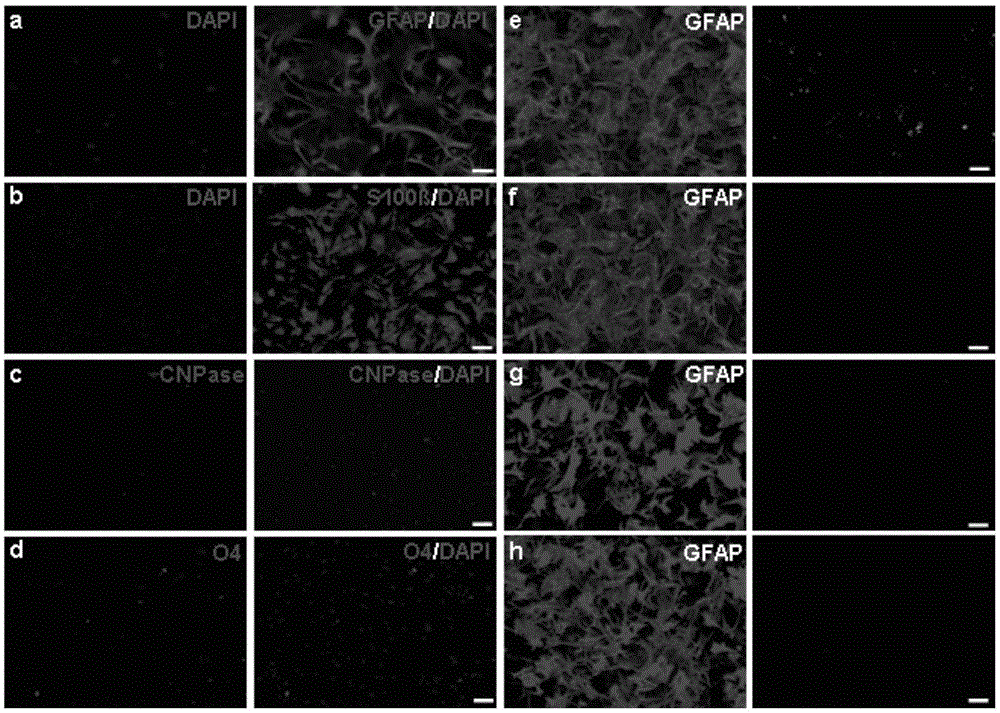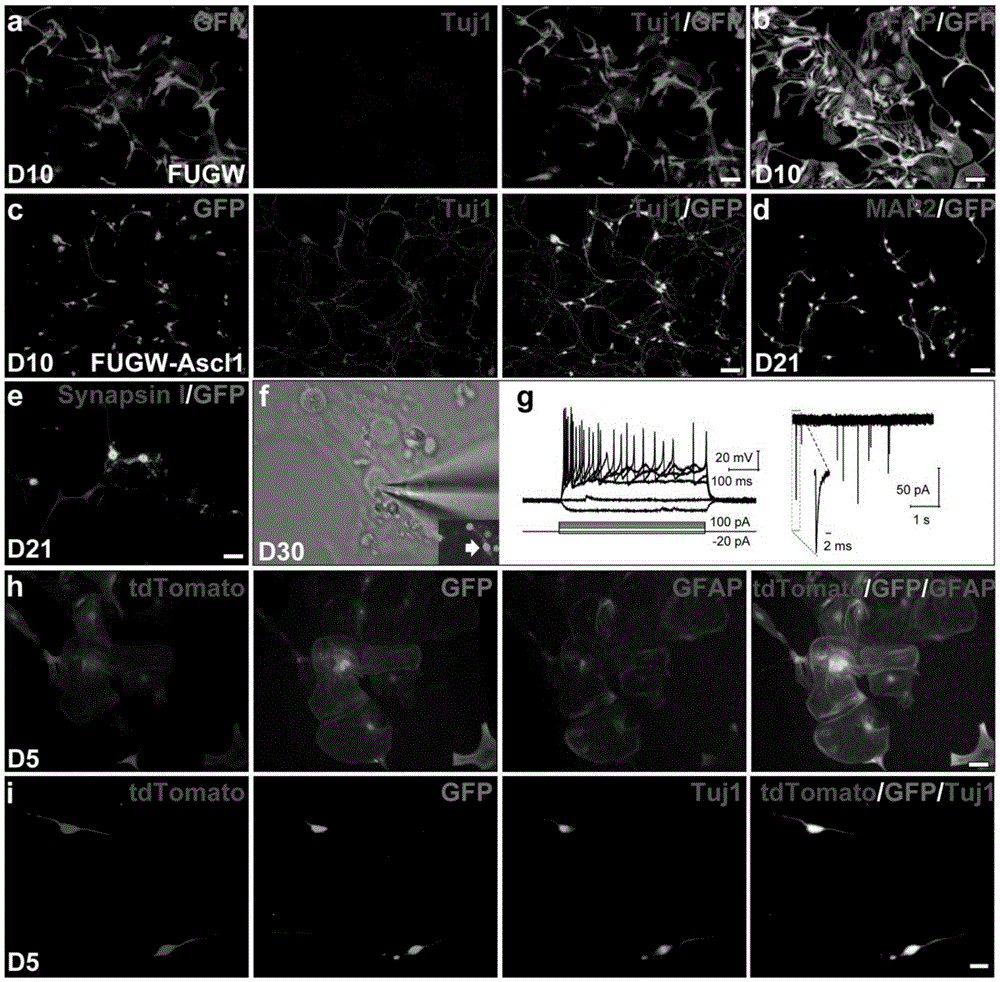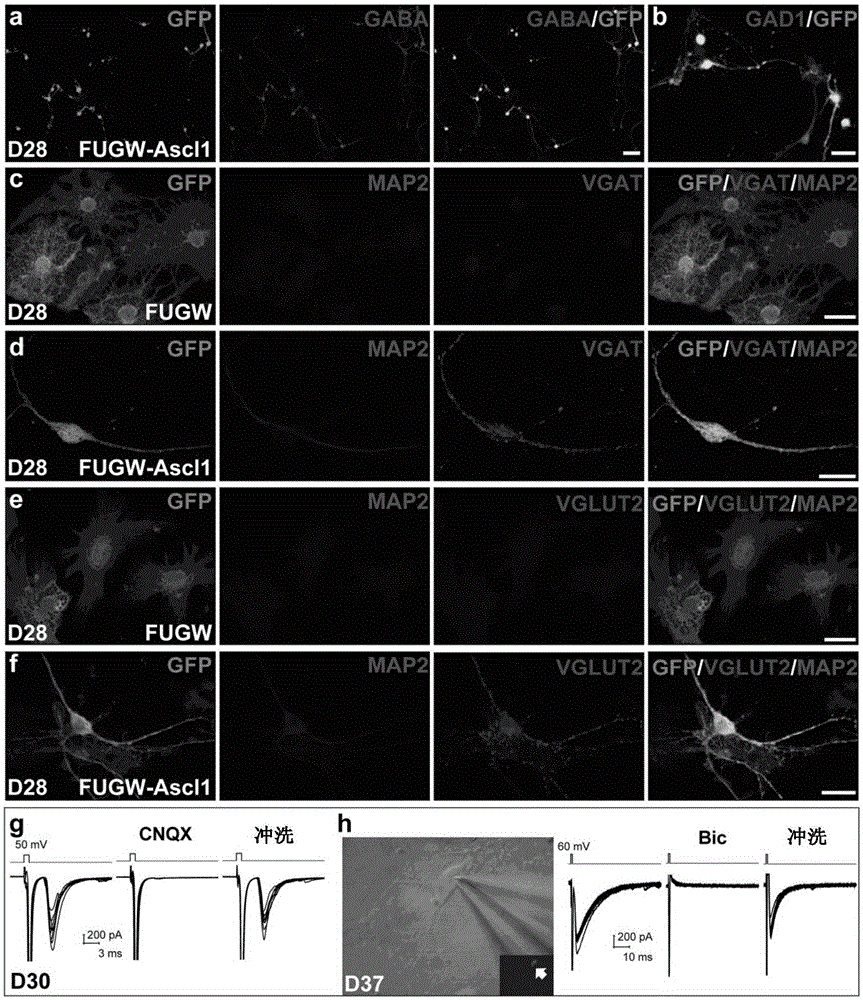Application of Ascl1 in induction of transdifferentiation of astrocytes into functional neurons
Astrocytes, a functional technology for use in biotechnology and cell therapy
- Summary
- Abstract
- Description
- Claims
- Application Information
AI Technical Summary
Problems solved by technology
Method used
Image
Examples
preparation example Construction
[0116] The preparation of astrocytes refers to "Preparation of separate astroglia and oligodendroglial cells from rat cerebral tissue" (McCarthy, K.D. & de Vellis, J.J. Cell Biol. 85, 890-902 (1980)). The dorsal midbrain of postnatal day 5-7 mice or adult mice was removed and digested with 0.25% trypsin for 15 min. The blown cells were cultured in DMEM / F12 solution containing 10% serum for 7-9 days. After the oligodendrocytes are removed by shaking, the obtained cells are astrocytes.
[0117] immunochromogenic
[0118]For the immunochromogenicity of cultured cells, refer to "Direct conversion off ibroblaststofunctional neurons by defined factors" (Vierbuchen, T. et al. Nature 463, 1035-1041 (2010)). The immunochromogenic combination of tissue sections combined with in situ hybridization and immunochromogenic double labeling experiments refer to published methods conduct. The primary antibodies used for immunochromogenicity include: mouseanti-GFAP (Millipore, 1:1,000), rabbi...
Embodiment 1
[0124] Example 1 plasmid construction and virus infection
[0125] The cDNA of mouse Ascl1 gene was cloned into lentiviral expression vector FUGW-IRES-EGFP to obtain FUGW-Ascl1. Replacement of GFP in the FUGW-Ascl1 plasmid with tdTomato yielded FUW-Ascl1-tdTomato. The empty lentiviral expression vector FUGW and FUW-tdTomato were used as controls respectively. The packaging of lentivirus refers to the literature "Production and purification of lentiviral vectors" (Tiscornia, G., Singer, O. & Verma, I.M. Nat. Protoc. 1, 241-245 (2006)).
[0126] Add lentivirus after 24 hours of plate culture of astrocytes, and replace the medium after 24 hours of infection: DMEM / F12, B27, Glutamax and penicillin / streptomycin. After 6-7 days of infection, brain-derived neurotrophic factor (BDNF; PeproTech, 20 ng / ml) was added to the medium every three days.
[0127] To make the GFAP-AAV vector, the CMV promoter in the AAV-FLEX-Arch-GFP plasmid (Addgene) was replaced with the hGFAP promoter (2....
Embodiment 2A
[0128] Example 2 Ascl1 will in vitro Transdifferentiation of dorsal midbrain astrocytes into neurons
[0129] Firstly, astrocytes from the dorsal midbrain of postnatal day 5-7 (P5-P7) mice were isolated and purified. The properties of these glial cells were verified by examining molecular markers of different cell types ( figure 1 ). Most of the cells express GFAP and S100β, the marker molecules of astrocytes, a small amount of cells express O4 and CNPase, the marker molecules of oligodendrocytes, and a small number of cells express NG2, the marker molecules of NG2 glial cells, which are not detected Expression of neuron marker Tuj1 and stem cell markers Sox2 and Oct4.
[0130] result
[0131] 2.1 Transformed astrocytes express mature neuron marker molecules
[0132] Ten days after the astrocytes were transfected with the control lentiviral vector FUGW, the astrocytes did not express the neuron marker molecule Tuj1( figure 2 a), still maintaining the morphology of glia...
PUM
 Login to View More
Login to View More Abstract
Description
Claims
Application Information
 Login to View More
Login to View More - R&D
- Intellectual Property
- Life Sciences
- Materials
- Tech Scout
- Unparalleled Data Quality
- Higher Quality Content
- 60% Fewer Hallucinations
Browse by: Latest US Patents, China's latest patents, Technical Efficacy Thesaurus, Application Domain, Technology Topic, Popular Technical Reports.
© 2025 PatSnap. All rights reserved.Legal|Privacy policy|Modern Slavery Act Transparency Statement|Sitemap|About US| Contact US: help@patsnap.com



